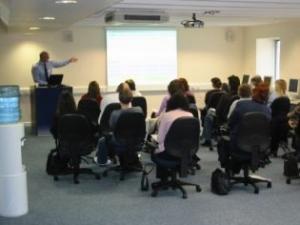Why is health and safety training important?
This week I thought it might be useful to look at Health & Safety Training and why it is important.
I am going to explain what you, as an employer, may need to do to ensure your employees receive appropriate health and safety training. I also aim to give advice on who may need training, what form the training may take and how to organise it.
This article will hopefully be useful to employers, employees and their representatives.
This week’s 2 recent HSE case look at:
- During the attempt his foot got stuck between the brake and the accelerator and the truck reversed. Philip, who was standing between the two vehicles, suffered crush injuries. He was pronounced dead at the scene
- Acting on the public concerns, HSE carried out three inspections of the site. On each visit the inspectors and visiting officers found numerous breaches of health and safety legislation.
As ever, if you have a subject that you would like us to cover one week, please contact us by phone 01458 253682, email or via our Facebook page or by Twitter
Why is health and safety training important?
Over 200 people are killed each year in accidents at work and over one million people are injured. Over two million suffer illnesses caused by, or made worse by, their work.
So, preventing accidents and ill health caused by work should be a key priority for everyone at work. As the owner or manager of a business you know that competent employees are valuable. Your business probably depends on them.
What is training?
Training means helping people to learn how to do something, telling people what they should or should not do, or simply giving them information. Training isn’t just about formal ‘classroom’ courses.
Within many industries, there is growing concerns about the level of competence and high expectations of newly trained/qualified operators. What makes someone more employable and valued is their experience gained through on the job training & consolidation, and non formal training in the form of ‘continuous professional development’ (CPD).
In the professions, great importance is placed on lifelong learning. Without this learning, the knowledge gained from innovation and work experience will not spread throughout your industry. General working experience is recognised as valuable evidence of workers employability. To help demonstrate this, the evidence needs to be recorded. Currently, there is no national scheme in treework for recognising or recording this. In the 21st century, CPD is vitally important to your employees, your business and your client. If CPD is managed effectively then your business benefits from increased profitability and competitiveness. You have a more efficient & flexible workforce and are able to better utilise your staff resources.
Your members of staff become more motivated, remain loyal and committed. Management of CPD allows you, the employers, to attract, recruit & retain the best people. By demonstrating workforce competence your business is given direction and an enhanced image. This is not just about health and safety. Increasingly, clients are demanding evidence of ability to undertake contracts to a suitable quality, and businesses have been shown to benefit from being able to provide this information, by winning contracts over other companies.
Within the professions, CPD is seen as the systematic maintenance, improvement & broadening of professional knowledge. Greater understanding and improved skills lead to the development of personal qualities deemed necessary to undertake professional and technical duties, throughout one’s working life. Keeping up to date with new technical & business related subjects in your profession is important and it’s about being even better at what you do.
Why provide health and safety training?
Providing health and safety information and training helps you to:
- ensure that people who work for you know how to work safely and without risks to health;
- develop a positive health and safety culture, where safe and healthy working becomes second nature to everyone;
- meet your legal duty to protect the health and safety of your employees.
Effective training:
- will contribute towards making your employees competent in health and safety;
- can help your business avoid the distress that accidents and ill health cause;
- can help you avoid the financial costs of accidents and occupational ill health, such as damaged products, lost production and demotivated staff. Don’t forget that your insurance might not cover all these costs.
What does it say in the law?
The Health and Safety at Work etc. Act 1974 requires you to provide whatever information, instruction, training and supervision as is necessary to ensure, so far as is reasonably practicable, the health and safety at work of your employees.
This is expanded by The Management of Health and Safety at Work Regulations 1999, which identify situations where health and safety training is particularly important, e.g. when people start work, on exposure to new or increased risks and where existing skills may have become rusty or need updating.
Like many employers, you may not be in a position to provide this training on your own, in which case you will need competent help. That is why The Wilkins Safety Group provide training courses, both ‘open’ and ‘in house’ courses.
Safety Representatives and Safety Committees Regulations 1977 and the Health and Safety (Consultation with Employees) Regulations 1996 require you to consult your employees, or their representatives, on health and safety issues. Representatives appointed under either of these sets of regulations are entitled to time off with pay for training in their duties.
The Health and Safety (Training for Employment) Regulations 1990 ensure that learners doing work experience are covered by health and safety law.
There are a number of other regulations that include specific health and safety training requirements, e.g. asbestos, diving and first aid.
What about self-employed people?
A person working under your control and direction is treated as self-employed for tax and national insurance purposes, they may nevertheless be treated as your employee for health and safety purposes. You need, therefore, to take appropriate action to protect them.
If you do not wish to employ workers on this basis, you should seek legal advice. Ultimately, each case can only be decided on its own merits by a court of law.
Who needs health and safety training?
You do! Whether you are an employer or self-employed, are you sure that you’re up to date with how to identify the hazards and control the risks from your work? Do you know how to get help – from your trade association, your local Chamber of Commerce, or your health and safety enforcing authority? Do you know what you have to do about consulting your employees, or their representatives, on health and safety issues? If not, you would probably benefit from some training.
Your managers and supervisors do! If you employ managers or supervisors they need to know what you expect from them in terms of health and safety, and how you expect them to deliver. They need to understand your health and safety policy, where they fit in, and how you want health and safety managed. They may also need training in the specific hazards of your processes and how you expect the risks to be controlled.
Your employees do! Everyone who works for you, including self-employed people, needs to know how to work safely and without risks to health. Like your supervisors, they need to know about your health and safety policy, your arrangements for implementing it, and the part they play. They also need to know how they can raise any health and safety concerns with you.
Contractors and self-employed people who may be working for you do! Remember, these people might not be familiar with your working environment and safety systems that you have put in place for regular employees.
You should:
- take into account the capabilities, training, knowledge and experience of workers; and
- ensure that the demands of the job do not exceed their ability to carry out their work without risk to themselves and others.
Some employees may have particular training needs, for example:
- new recruits need basic induction training into how to work safely, including arrangements for first aid, fire and evacuation;
- people changing jobs or taking on extra responsibilities need to know about any new health and safety implications;
- young employees are particularly vulnerable to accidents and you need to pay particular attention to their needs, so their training should be a priority. It is also important that new, inexperienced or young employees are adequately supervised;
- employee representatives or safety representatives will require training that reflects their responsibilities;
- some people’s skills may need updating by refresher training.
Your risk assessment should identify any further training needs associated with specific risks.
Useful ‘Toolbox’ talks.
Of course it costs money sending employees away on day long courses, so it may not be an attractive prospect. However, what you should be considering is sending them on full courses at the start, such as a general safety awareness course. This should then be followed up by regular short ‘Toolbox’ talks which can be run on site or over a cup of coffee. These ‘Toolbox’ talks are meant to be used as refresher courses on individual topics that were covered in the earlier day long course. Such as PPE, COSHH etc.
We are running courses
The Wilkins Safety Group is running two CDM2015 Awareness courses at Taunton Racecourse on 27th and 30th April – see separate notice. We are also looking to run General Health & Safety Awareness courses, First Aid courses, Risk Assessment courses, Asbestos Awareness courses, Manual Handling courses and Fire awareness courses throughout the year.
If you would like any further help or support, please please contact us by phone 01458 253682, email or via our Facebook page or by Twitter
We are exhibiting THIS WEEK!!
As part of our 25th anniversary celebrations the Wilkins Safety Group are exhibiting at 3 Business Expos this year in Exeter, Swindon and Bristol.
The first of these is at this year’s South West Business Expo, probably the largest business expo in the South West. The SW Business Expo takes place on Thursday 30th March 2017 (1000 – 1600) at the Matford Centre in Exeter, EX2 8FD. There is plenty of free parking on site and cafe selling food and drink throughout the day.
There will be over 170 exhibitors from across the South West and beyond, including ourselves, 5 seminars, 6 workshops, Technology Zone, Motor Zone, Charity Zone, New Business Zone, Food and Hospitality Zone, Live Cookery Demonstrations and even 3 Speed Networking Sessions! It is a great day out for people in business with huge networking opportunities as there will be around 2000 delegates attending!!!!
Come along see us on our stand No 131 and have a look around you will meet some interesting people and perhaps even do some business!
It is FREE to attend if you register in advance, on the day there is a door fee of £5 all of which goes to the organiser’s Charity, Exeter Leukaemia Fund. Book your place at the expo here: www.southwestbusinessexpo.co.uk
We look forward to seeing you there on the day!
There will also be free to enter Prize Draw
Wilkins Safety Group are going to hold a Prize Draw towards the end of the day with prizes including: Champagne, Prosecco, Chocolates and Pot Pourri in a jar.
In order to have a chance to win one of these prizes, all you need do is come and talk to us on the stand and leave your business card with the member of our staff that you talked to. What could be easier?
Training Courses
WE have already run a number of courses in 2017.
There are more courses to follow in April, May and June – These will be listed shortly.
We are also looking to run some short Health and Safety awareness sessions to emphasise the need for improving your H&S procedures.
Also remember we are still available for running “In House” courses and are looking to add new training courses to our list.
If you have any questions about these courses or any other training or would like us to run a particular course for you, call Jon Wilkins of the Wilkins Safety Group on 01458 253682 or email him.
